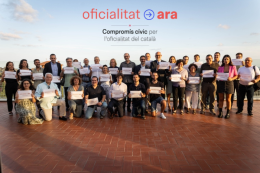This afternoon, the manifesto Civic Pledge for Official Status for Catalan was presented at the headquarters of the Spanish Medical Association, coinciding with the negotiations to be carried out by the Spanish State to ensure that Catalan is included as an official language of the European Union on 19 September.
The signatories of this pledge, including Plataforma per la Llengua, Òmnium Cultural, Acció Cultural del País Valencià, Obra Cultural Balear, Futbol Club Barcelona, the Barcelona Medical Association, the Barcelona and Girona Chambers of Commerce and the employers' organisations Fundació d'Empresaris de Catalunya-FemCAT and CECOT, have insisted on the importance of the language becoming official because of the consequences that this would have on a day-to-day basis within the Catalan linguistic domain. The pledge was read by the Valencian journalist Nerea San Félix.
They have also celebrated the fact that the Spanish government, impelled by political negotiations, has formally submitted a request for Article 1 of Regulation 1/1958 (which establishes the official languages) to be amended in the right way. In addition, they hold the government responsible for the outcome of the debate and the eventual vote on the 19 September in the EU Council.
In the Civic Pledge for Official Status for Catalan, the organisations also challenge the Spanish government to explain that there is no legal impediment to official status.
The text also recalls that "until the end of the year, the Spanish State is presiding over the EU Council, which is the body responsible for amending Regulation 1/1958 (...). This gives the State bargaining power to get the other States to vote in favour of official status". The first opportunity is the meeting of the EU Council to be held on 19 September. This is a historic opportunity to get the 13th most spoken language in Europe, with more than 10 million speakers and with a presence in three different States of the European Union, to become the 25th official language.
The signatories of the manifesto state that "official status is not a merely symbolic request. The official status of a language in the Union has direct consequences in use and projection within their linguistic domain". It must be remembered that European regulations leave non-official languages out of many areas. Therefore, Catalan "would become more useful and necessary in various work areas, creating a virtuous circle to encourage people to learn it. The benefits of official status are many, and would lead to tangible improvements in terms of the health of the language".
On the 5 September , it was announced that the official status of Catalan will be debated at the session of the European Union Council that will take place on 19 September. On that day, there will be a debate and eventually a vote on whether Catalan will become official in the European Union. It should be borne in mind that the Council has not overturned any of the 1,128 votes held in the last decade. However, the president of Plataforma per la Llengua, Óscar Escuder, has recalled that "unanimity of all States" is required in this vote and that "it would be no consolation at all" if the initiative failed, but the speaking of Catalan was allowed in the European Parliament instead.
Catalan, An Official Language now!
Last February, nine organisations from the language field - Plataforma per la Llengua, Òmnium Cultural, Obra Cultural Balear, Acció Cultural del País Valencià, La Intersindical, the Barcelona Chamber of Commerce, l'Institut d'Estudis Eivissencs, la Fundació d'Empresaris de Catalunya-FemCAT and Obra Cultural Balear de Formentera - promoted the manifesto Catalan, an Official Language Now! The text called on the Spanish government to request the recognition of Catalan as an official language of the European Union. In a few days, dozens of organisations joined the manifesto, including Barça football club, Escola Valenciana, CECOT, the University of Girona, the Chambers of Commerce of Girona and Terrassa, the Barcelona Medical Association, Hospital Clínic, La Bressola and Softcatalà, to name just a few.
The manifesto also received more than 46,000 clicks of support. And you've still got time: the manifesto remains open bodies and organisations who still want to support the request.
- If you want us to continue working to make Catalan official in the European Union, join more than 25,000 members who already support us: become a member in 3 minutes!




